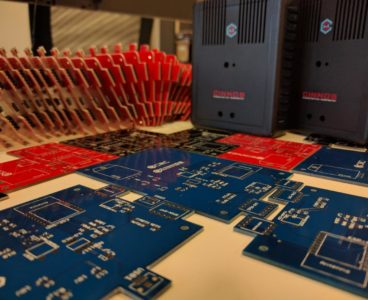McMaster researchers have developed a simple and highly novel form of computing by shining patterned bands of light and shadow through different facets of a polymer cube and reading the combined results that emerge. The material in the cube reads and reacts intuitively to the light in much the same way a plant would turn…
DNA Analysis of Ancient Mummy, Thought to Have Smallpox, Points to Hepatitis B Infection Instead
A team of scientists has sequenced the complete genome of an ancient strain of the Hepatitis B virus (HBV), shedding new light on a pervasive, complex and deadly pathogen that today kills nearly one million people every year. While little is known about its evolutionary history and origin, the findings confirm the idea that HBV…
Pharmaceuticals and Other Contaminants Force Fish to Work Much Harder to Survive
Pharmaceuticals and other man-made contaminants are forcing fish that live downstream from a typical sewage treatment plant to work at least 30 per cent harder just to survive, McMaster researchers have found. The effort to decontaminate their bodies from pollutants that persist even after water treatment makes fish vulnerable by forcing them to burn energy…
Researchers Find Genes May ‘Snowball’ Obesity
Researchers Make Data Centers More Efficient
A McMaster University research centre has a received a near $1 million grant to create a smart system that monitors the vital signs of data centres, saving companies energy, labour time, and money. McMaster’s Computing Infrastructure Research Centre (CIRC) has partnered with Cinnos Mission Critical Incorporated, a McMaster-born data centre solutions company, to work on…
Post-Biotics May Help Shield Obese from Diabetes
Groundbreaking Technique Paves Way for Personalized Medicine Advances
Researchers Find Immunotherapy Treatments Better for Advanced Skin Cancer
Semiconducting Carbon Nanotubes Solve Major Technological Problem
Imagine an electronic newspaper that you could roll up and spill your coffee on, even as it updated itself before your eyes. It’s an example of the technological revolution that has been waiting to happen, except for one major problem that, until now, scientists have not been able to resolve. Researchers at McMaster University have…
Researchers Resolve Problem That’s Been Holding Back a Technological Revolution
Researchers Harness DNA As the Engine of Super-efficient Nanomachine
Researchers at McMaster University have established a way to harness DNA as the engine of a microscopic “machine” they can turn on to detect trace amounts of substances that range from viruses and bacteria to cocaine and metals. “It’s a completely new platform that can be adapted to many kinds of uses,” says John Brennan,…
Harnessing DNA as the Engine of Super-Efficient Nanomachine
Researchers at McMaster University have established a way to harness DNA as the engine of a microscopic “machine” they can turn on to detect trace amounts of substances that range from viruses and bacteria to cocaine and metals. “It’s a completely new platform that can be adapted to many kinds of uses,” says John Brennan,…
From Fire Breaks to Fire Hazards
The peat bogs of the world, once waterlogged repositories of dead moss, are being converted into fuel-packed fire hazards that can burn for months and generate deadly smoke, warns a McMaster researcher who documents the threat — and a possible solution — in a paper published today in the journal Nature Scientific Reports. Since the glaciers…









